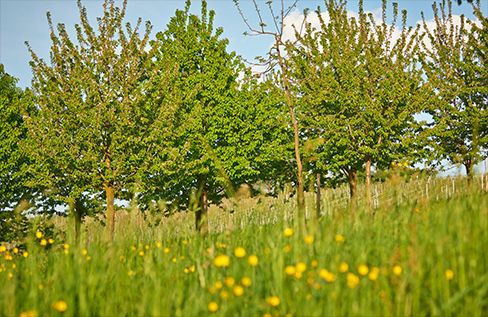
American Farmland Trust (AFT), Natural Resource Conservation Service (NRCS) and Tall Pines Conservancy (TPC) announce they will join together on the “Wisconsin Farmland Protection Partnership Project” through the Regional Conservation Partnership Program (RCPP) to address the need for increased agricultural conservation easement funding in the state. The project will leverage more than $7 million in partner contributions for an additional $7 million in federal funding to stem farmland loss, incentivize the increased adoption of regenerative practices on protected land, and identify farmland access opportunities for historically underserved producers.
The project will be led by AFT and the NRCS and bring together a host of partners including: Tall Pines Conservancy, a local land trust, 6 other Wisconsin-based land trusts, the Town of Dunn, Town of Greenville, Rock County, Jefferson County, The Savanna Institute, Gathering Waters, Michael Fields Agricultural Institute, UW-Division of Extension, UW-Dept. of Agronomy, WI Land + Water, and Dept. of Agriculture, Trade & Consumer Protection. Together the partners will work to maximize the impact of permanent protection while fostering environmental benefits and addressing equity issues in farmland access.
“We are thrilled to be a part of this significant and innovative statewide partnership project,” says Susan Buchanan, Executive Director of Tall Pines Conservancy. “Land Trusts that have been working diligently to protect farmland across the state will now have this critical tool available to them to preserve more agricultural land that is essential to our state’s economy and defines our rural character for which Wisconsin is known.”
In AFT’s recent release of Farms Under Threat, we found Wisconsin is among the leading states in the nation for the conversion of agricultural land to urban, highly developed, and low-density residential land use. Between 2001 and 2016, nearly 250,000 acres of land was converted out of agricultural use—lost land that could have generated $190 million in annual revenue. Our response is utilizing easement dollars strategically, where they are most needed.
Wisconsin has some of the best agricultural land in the country, with 61% of the state’s farmland considered nationally significant. Across the state, farmers strive to keep their land in farming yet have limited financial options to help ensure the continued availability of farmland. One of the key mechanisms for permanently protecting valuable agricultural land has been unavailable to serve the farmers it was created to help. The RCPP project will enable partners to stretch federal funds and support farmers who wish to protect their land for future generations.
“We see the Wisconsin Farmland Protection Partnership Project as a real opportunity to respond to and address significant farmland loss identified in the AFT Farms Under Threat report,” expresses Alison Volk, Easement Project Manager of American Farmland Trust. “The RCPP project will enable partners to protect important farmland across the state. Agricultural easements can anchor larger blocks of farmland and support the future of sustainable farming in Wisconsin.”
“The Regional Conservation Partnership Program is public-private partnership working at its best,” says Terry Cosby, Acting Chief for USDA’s Natural Resources Conservation Service. “These new projects will harness the power of partnership to help bring about solutions to natural resource concerns across the country while supporting our efforts to combat the climate crisis.”
Over the next 5 years, the partnership will utilize easement dollars strategically, informed by the expertise of practitioners and AFT’s Farms Under Threat analysis, to help protect land where that protection may have the greatest impact.
The funds from this project will continue American Farmland Trust’s work to save the land that sustains us by protecting farmland, promoting environmentally sound farming practices, and keeping farmers on the land. Special thanks to the many partners who made this project possible.

